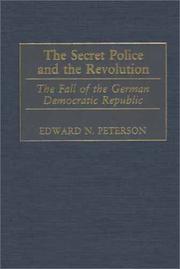| Listing 1 - 10 of 27 | << page >> |
Sort by
|
Book
ISBN: 2879490227 Year: 1992 Publisher: Paris Bertoin
Abstract | Keywords | Export | Availability | Bookmark
 Loading...
Loading...Choose an application
- Reference Manager
- EndNote
- RefWorks (Direct export to RefWorks)
Internal security --- Secret service --- 351.746.1 <430.2> --- Germany (East). --- Germany (Democratic Republic, 1949- ). --- Stasi --- MfS --- Staatssicherheitsdienst der DDR --- Germany (East) --- Politics and government.
Book
ISBN: 3942130947 Year: 2013 Publisher: Berlin
Abstract | Keywords | Export | Availability | Bookmark
 Loading...
Loading...Choose an application
- Reference Manager
- EndNote
- RefWorks (Direct export to RefWorks)
Espionage --- Germany (West). --- Germany (East). --- History. --- Germany (West) --- Politics and government --- Covert operations (Espionage) --- Operations, Undercover (Espionage) --- Spying --- Undercover operations (Espionage) --- Intelligence service --- Spies --- Germany (Democratic Republic, 1949- ). --- Stasi --- MfS --- Staatssicherheitsdienst der DDR --- Germany (Federal Republic, 1949- ). --- Germany.

ISBN: 387134057X Year: 1992 Publisher: Berlin Rowohlt
Abstract | Keywords | Export | Availability | Bookmark
 Loading...
Loading...Choose an application
- Reference Manager
- EndNote
- RefWorks (Direct export to RefWorks)
Authors, German --- Internal security --- German authors --- Security, Internal --- Insurgency --- Subversive activities --- Biography --- Political and social views --- History --- Germany (East). --- Germany (Democratic Republic, 1949- ). --- Stasi --- MfS --- Staatssicherheitsdienst der DDR --- Germany (East) --- Politics and government
Book
ISBN: 1282613456 9786612613456 0199750815 9780199750818 9780195392050 0199779872 Year: 2010 Publisher: Oxford [etc.] Oxford University Press
Abstract | Keywords | Export | Availability | Bookmark
 Loading...
Loading...Choose an application
- Reference Manager
- EndNote
- RefWorks (Direct export to RefWorks)
"Based on previously classified documents and on interviews with former secret police officers and ordinary citizens, The Firm is the first comprehensive history of East Germany's secret police, the Stasi, at the grassroots level. Focusing on Gransee and Perleberg, two East German districts located north of Berlin, Gary Bruce reveals how the Stasi monitored small-town East Germany. He paints an eminently human portrait of those involved with this repressive arm of the government, featuring interviews with former officers that uncover a wide array of personalities, from devoted ideologues to reluctant opportunists, most of whom talked frankly about East Germany's obsession with surveillance. Their paths after the collapse of Communism are gripping stories of resurrection and despair, of renewal and demise, of remorse and continued adherence to the movement. The book also sheds much light on the role of the informant, the Stasi's most important tool in these out-of-the-way areas. Providing on-the-ground empirical evidence of how the Stasi operated on a day-to-day basis with ordinary people, this remarkable volume offers an unparalleled picture of life in a totalitarian state"-- "The Stasi, East Germany's secret police was the largest per capita secret police in world history. The territorial units of the Stasi, the small offices that dotted the countryside and undertook the lion's share of internal surveillance, responsible for running the majority of the Stasi's Informants or societal "collaborators," have received virtually no attention in the scholarly literature. The Firm will be the first book to trace the history of the Stasi at a district level. Based on previously inaccessible secret police files and interviews with former members of the East German security apparatus, it provides an unparalleled picture of life in a totalitarian state. This book is based on 14 interviews with former secret police personnel from the districts under study, the most interviews ever conducted with former Stasi by one person, and 30 interviews with "ordinary" people in the districts in order to address daily life in a dictatorship, as well as the regional Stasi archives. This book will it provide a new approach to understanding totalitarianism and life in a late 20th century police state and will address major issues such as the use of intelligence in the concept of security and the limits of an "acceptable" level of surveillance"--
Intelligence service --- Secret service --- Counter intelligence --- Counterespionage --- Counterintelligence --- Intelligence community --- Secret police (Intelligence service) --- Public administration --- Research --- Disinformation --- History. --- Germany (East). --- Germany (Democratic Republic, 1949- ). --- Stasi --- MfS --- Staatssicherheitsdienst der DDR --- Germany (East) --- Politics and government.

ISBN: 027597328X 9780313075414 0313075417 9780275973285 Year: 2002 Publisher: Westport, Conn. : Praeger,
Abstract | Keywords | Export | Availability | Bookmark
 Loading...
Loading...Choose an application
- Reference Manager
- EndNote
- RefWorks (Direct export to RefWorks)
History of Germany and Austria --- anno 1900-1999 --- Germany (GDR) --- Intelligence service --- Internal security --- Opposition (Political science) --- Germany (East). --- Germany (Democratic Republic, 1949- ). --- Stasi --- MfS --- Staatssicherheitsdienst der DDR --- Germany (East) --- Politics and government.
Book
ISBN: 0813334098 Year: 1999 Publisher: Boulder, Colo. : Westview Press,
Abstract | Keywords | Export | Availability | Bookmark
 Loading...
Loading...Choose an application
- Reference Manager
- EndNote
- RefWorks (Direct export to RefWorks)
Secret service --- Service secret --- History --- Histoire --- Germany (East). --- History. --- Germany (East) --- Allemagne (Est) --- Politics and government --- Politique et gouvernement --- -#SBIB:328H222 --- #SBIB:35H141 --- #SBIB:IEB --- Secret police (Secret service) --- Police --- Detectives --- Intelligence service --- Spies --- Instellingen en beleid: Duitse Demokratische Republiek (historisch) --- Bijzondere korpsen: politie en rijkswacht --- Germany (East). Ministerium fur Staatssicherheit --- #SBIB:328H222 --- Germany (Democratic Republic, 1949- ). --- Stasi --- MfS --- Staatssicherheitsdienst der DDR
Book
Abstract | Keywords | Export | Availability | Bookmark
 Loading...
Loading...Choose an application
- Reference Manager
- EndNote
- RefWorks (Direct export to RefWorks)
Authors, German --- Informers --- Literature and state --- Political activity. --- Political activity --- Informants (Criminal investigation) --- Police informers --- Stool pigeons --- Complaints (Criminal procedure) --- Crime prevention --- Criminal investigation --- Prosecution --- State's evidence --- German authors --- Grass, Günter, --- Political and social views. --- Germany (East). --- Germany (Democratic Republic, 1949- ). --- Stasi --- MfS --- Staatssicherheitsdienst der DDR --- Records and correspondence. --- Snitches (Informers) --- Persons
Book
ISBN: 9781782382553 1782382550 9781306405973 1306405971 9781782382546 1782382542 Year: 2014 Publisher: New York Oxford
Abstract | Keywords | Export | Availability | Bookmark
 Loading...
Loading...Choose an application
- Reference Manager
- EndNote
- RefWorks (Direct export to RefWorks)
The East German Ministry for State Security stood for Stalinist oppression and all-encompassing surveillance. The "shield and sword of the party," it secured the rule of the Communist Party for more than forty years, and by the 1980s it had become the largest secret-police apparatus in the world, per capita. Jens Gieseke tells the story of the Stasi, a feared secret-police force and a highly professional intelligence service. He inquires into the mechanisms of dictatorship and the day-to-day effects of surveillance and suspicion. Masterful and thorough at once, he takes the reader through t
Internal security --- Secret service --- Security, Internal --- Insurgency --- Subversive activities --- History. --- Germany (East). --- Germany (Democratic Republic, 1949- ). --- Stasi --- MfS --- Staatssicherheitsdienst der DDR --- Sûreté de l'Etat --- Service secret --- History --- Histoire --- GDR. --- German Democratic Republic. --- German history. --- Germany. --- cold war history. --- cold war. --- communism. --- communist state. --- east berlin. --- east germany. --- secret police. --- socialist state. --- stasi.

ISBN: 1134632215 1280334789 0203004604 9780203004609 0203163249 9780203163245 0415202612 9781134632169 9781134632206 9781134632213 9780415202619 9780415757690 1134632207 Year: 1999 Publisher: London New York Routledge
Abstract | Keywords | Export | Availability | Bookmark
 Loading...
Loading...Choose an application
- Reference Manager
- EndNote
- RefWorks (Direct export to RefWorks)
Analysing Stasi files and interviews with one time informers, the author examines the confrontation with this legacy in united Germany. She discusses the daily machinations of the state and the motivation and justification of being an informer.
Informers --- Internal security --- Security, Internal --- Insurgency --- Subversive activities --- Informants (Criminal investigation) --- Police informers --- Stool pigeons --- Complaints (Criminal procedure) --- Crime prevention --- Criminal investigation --- Prosecution --- State's evidence --- History. --- Germany (East). --- Germany (Democratic Republic, 1949- ). --- Stasi --- MfS --- Staatssicherheitsdienst der DDR --- Germany --- Politics and government --- Snitches (Informers) --- Persons
Book
ISBN: 1283078341 9786613078346 0226297950 9780226297958 9781283078344 9780226297934 9780226297941 0226297934 0226297942 Year: 2010 Publisher: Chicago ; London University of Chicago Press
Abstract | Keywords | Export | Availability | Bookmark
 Loading...
Loading...Choose an application
- Reference Manager
- EndNote
- RefWorks (Direct export to RefWorks)
What does the durability of political institutions have to do with how actors form knowledge about them? Andreas Glaeser investigates this question in the context of a fascinating historical case: socialist East Germany's unexpected self-dissolution in 1989. His analysis builds on extensive in-depth interviews with former secret police officers and the dissidents they tried to control as well as research into the documents both groups produced. In particular, Glaeser analyzes how these two opposing factions' understanding of the socialist project came to change in response to countless everyday experiences. These investigations culminate in answers to two questions: why did the officers not defend socialism by force? And how was the formation of dissident understandings possible in a state that monopolized mass communication and group formation? He also explores why the Stasi, although always well informed about dissident activities, never developed a realistic understanding of the phenomenon of dissidence. Out of this ambitious study, Glaeser extracts two distinct lines of thought. On the one hand he offers an epistemic account of socialism's failure that differs markedly from existing explanations. On the other hand he develops a theory-a sociology of understanding-that shows us how knowledge can appear validated while it is at the same time completely misleading.
Socialism --- Germany (East). --- Germany (Democratic Republic, 1949- ). --- Stasi --- MfS --- Staatssicherheitsdienst der DDR --- Germany (East) --- Politics and government. --- secret police, east germany, socialism, dissolution, politics, government, dissidents, political prisoners, revolution, resistance, protest, military, mass communication, group formation, stasi, rebellion, right consciousness, marx, party state, totalitarianism, opposition, nonfiction, history, men, masculinity, manhood, citizen, subject, authority, networks, discourse, disenchantment, disengagement, ideology.
| Listing 1 - 10 of 27 | << page >> |
Sort by
|

 Search
Search Feedback
Feedback About UniCat
About UniCat  Help
Help News
News